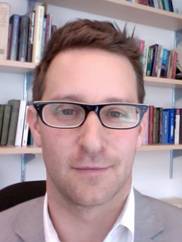 The Department of History is pleased to announce that David Koffman, currently a SSHRC Postdoctoral Fellow in the Department of History at the University of Toronto, has enthusiastically accepted the Dean's offer of a full-time appointment at the rank of Assistant Professor in the Department, effective July 1, 2013. On gaining tenure and promotion, he will assume the J. Richard Shiff Chair for the Study of Canadian Jewry.
The Department of History is pleased to announce that David Koffman, currently a SSHRC Postdoctoral Fellow in the Department of History at the University of Toronto, has enthusiastically accepted the Dean's offer of a full-time appointment at the rank of Assistant Professor in the Department, effective July 1, 2013. On gaining tenure and promotion, he will assume the J. Richard Shiff Chair for the Study of Canadian Jewry.
David is a cultural and social historian of the modern Jewish experience, with expertise in Canadian and American Jewries. His dissertation, which won the Salo Baron Award for best dissertation in Jewish history in the Americas (2008-2011), examined encounters between Jews and Native Americans in the late 19th and early 20th centuries. David received his Ph.D. from the Departments of History and Hebrew & Judaic Studies from NYU in 2011, and holds Masters degrees in Anthropology (University of Toronto), Jewish Studies (NYU) and Public Administration (Robert F. Wagner Graduate School of Public Service, NYU). During his SSHRC Post-Doctoral Fellowship at the University of Toronto he has begun research and writing on the cultural history of circumcision debates at the intersection of medicine and religion in American life. He is the co-editor of the journal Canadian Jewish Studies.
He is currently working on his first book, tentatively titled The Jews’ Indian: Empire, Pluralism and Belonging in America, 1854-1954. This research explores a century of Jewish engagements with Native peoples in the Americas. It argues that it was through these interactions that Jews created the ideological and cultural myths of their own belonging in the emerging American, and to some extent Canadian West, as well as the foundation for their economic and social mobility there. New immigrant frontier Jews adapted cultural tropes about North American Indians and used them strategically to work though their questions and anxieties about themselves as “tribal” outsiders. This research examines the frontier as a site of inter-ethnicity, and the place of religion, mobility, motility and class in the formation of racial governmentality. It frames Jewish migration history within the context of the nineteenth century national colonial and imperial projects, rather than as tales of Jewish immigrant accomplishments – the dominant historiographic lens through which Western Jewish history is usually written. It twins immigration and aboriginality, national identity and cultural diversity, humanism and primitivism, religious minorities and expansion.
His next project, a cultural history of circumcision in North America, aims to bring coherence to the perennial contests and debates surrounding circumcision in the nineteenth and twentieth centuries. It seeks to understand the place of religion in these social tensions by examining the ways that medical, civic and religious leaders linked race politics and national anxieties to a ritual surgery they associated with Jews and Judaism, as circumcision became a routinized medical practice.
As you can see, David will add important new strengths across a range of topics to the Department and, in due course, to the Graduate Programme in History, and we are very much looking forward to welcoming him in July to our midst.
In making this announcement, I would like to thank formally all members of the Department and Graduate Programme in History who took part in the search, and in particular Jennifer Stephen, who was the Department’s representative on the search committee.
If you would like to contact David Koffman to welcome him personally to the Department, his email address is currently david.koffman@utoronto.ca
